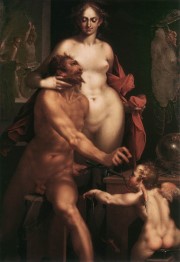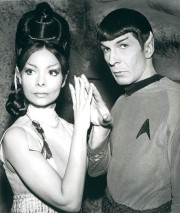|
Home
|
May 8, 2023
This week’s themeEponyms This week’s words Vulcan Taylorism Palladian gomer alexander 
Venus in Vulcan’s Forge
Art: Bartholomeus Spranger (1546-1611) 
Actors Arlene Martel as T’Pring & Leonard Nimoy as Spock
Photo: NBC / Wikimedia Previous week’s theme Star Wars A.Word.A.Day
with Anu GargWhen reality television personality Kim Kardashian split from her second husband 72 days after the wedding, comedian and singer “Weird Al” Yankovic remarked, “Seventy-two days is now an official unit of time known as a Kardash.” Reality television rarely ends well, for a marital union or the state of our Union. Speaking of which, the last reality television administration got us another unit of time: Scaramucci. Neither of these eponyms -- a word coined after someone -- has taken root in the English language. But over hundreds of years, many others have. In the past we have featured words coined after real people (Potemkin village), after fictional people (zelig), and even people from mythology (penelope). We have even featured multiple eponyms coined after a person. For example, Socrates. This week we are featuring words, each of which has more than one meaning. Now, here’s the twist. These multiple meanings are coined after two different people having the same name. Vulcan
PRONUNCIATION:
MEANING:
ETYMOLOGY:
For noun 1-4: After Vulcan, the god of fire and metalworking in Roman
mythology. Vulcan’s mother Juno
wanted a beautiful child and hurled the plain-looking baby Vulcan off Mount
Olympus. His leg broke when he hit the water. Vulcan may have been ugly
but he married Venus. On the
other hand, Venus was unfaithful to him. Earliest documented use: c. 450 CE. For noun 5 & adj.: After Vulcans, a humanoid species from the planet Vulcan in the Star Trek TV series and movies. Vulcans are extremely logical and show little emotion. Earliest documented use: 1966. USAGE:
“Your eyes dwell on a Vulcan -- a real blacksmith, brown, broad-shouldered.” Charlotte Brontë; Jane Eyre; Smith, Elder & Co.; 1847. “From a logical standpoint, it makes perfect sense. What the hell, if she had to release her inner Vulcan to hide behind, then so be it.” Stacy Gail; Ugly Ducklings Finish First; Carina Press; 2013. A THOUGHT FOR TODAY:
No two persons ever read the same book. -Edmund Wilson, critic (8 May
1895-1972)
|
|
Subscriber Services
Awards | Stats | Links | Privacy Policy
Contribute | Advertise
Awards | Stats | Links | Privacy Policy
Contribute | Advertise
© 1994-2026 Wordsmith